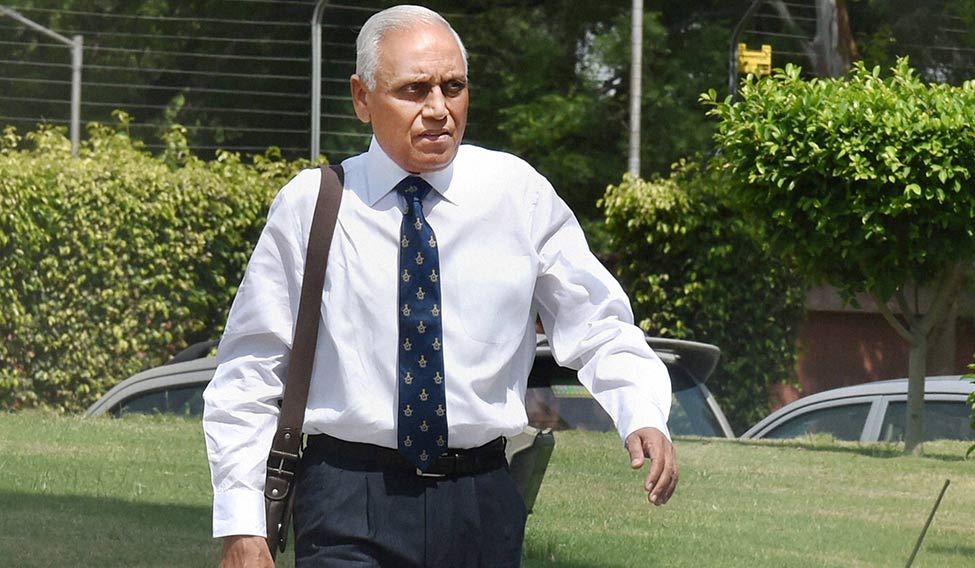Shashindra Pal Tyagi had thought it was for another routine questioning, which he had been used to by now, that he was being called to the Lodhi Road headquarters of the Central Bureau of Investigation on December 9. The former chief of the world’s fourth largest air force who had been used to fall-ins, smart salutes and guard-of-honours most of his life walked in with his usual swagger, only to be told, after an hour of conversation, that he was no longer at liberty even to walk out of that office.
At that moment, a new inglorious chapter was written into the black history of corruption in India. For the first time, a military chief, whose every word had been a command for one and a half lakh men, was placed under arrest. “Unfortunate,” his successor Air Chief Marshal Arup Raha who had saluted Tyagi several times in his career would later comment helplessly. “It dents our reputation...”
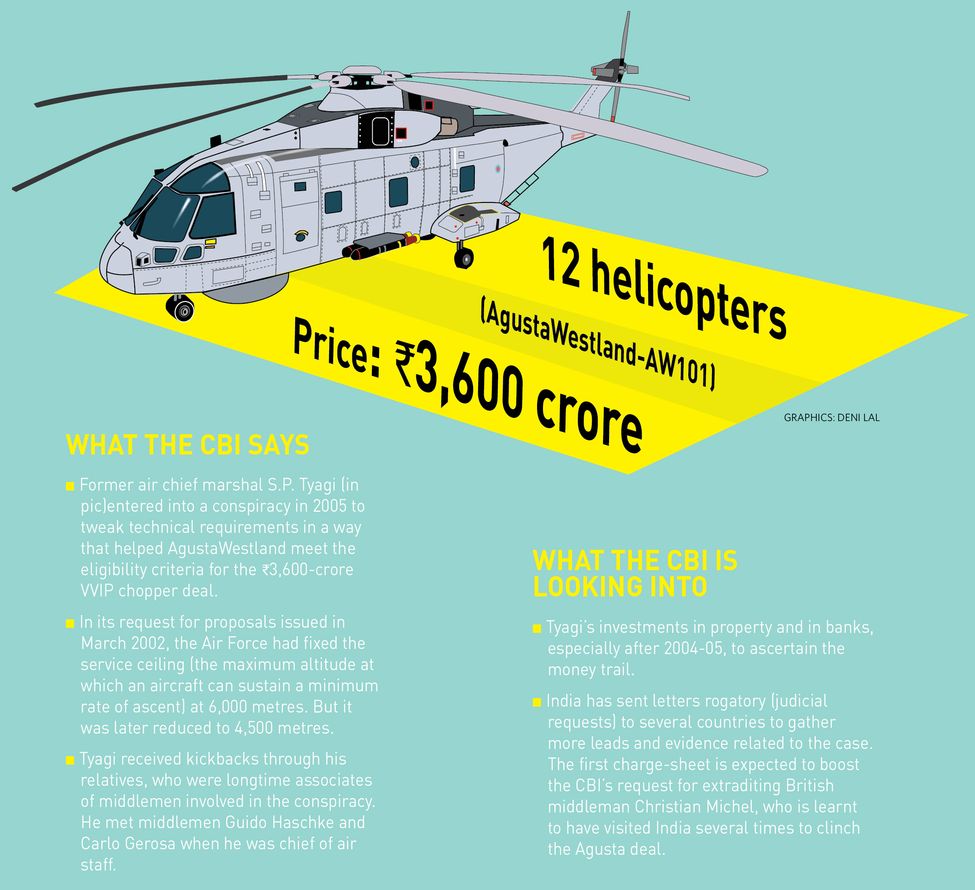
Tyagi’s arrest had been a foregone conclusion. Yet, when it happened, it was difficult for many to believe. “It’s a media trial,” protested his lawyer N. Hariharan, when THE WEEK contacted him for details of his defence. “We don’t even know what evidence the investigating agency has. Is it fair to judge someone before the trial has started?”
Ironically for a country that is used to corruption scandals in weapon purchases right from the days of Bofors guns and HDW submarines, the first case that sent a military chief to police custody didn’t pertain to anything lethal, but a few ‘luxury’ helicopters meant for VVIP flight. Tyagi is accused of having tweaked the specifications of a dozen helicopters that were to be bought for 13,600 crore from the world market in such a way as to suit AgustaWestland, an Anglo-Italian company owned by Italy’s Finmeccanica S.p.a., in 2010. Along with Tyagi, the CBI has arrested his cousin Sanjeev Tyagi alias Julie and a Delhi-based lawyer, Gautam Khaitan, who are alleged to have pocketed commission for swinging the deal for AgustaWestland. The FIR, registered on March 12, 2013 during the reign of the UPA government of Manmohan Singh, alleges that Tyagi “entered into a criminal conspiracy with the other accused” who include his three cousins Sanjeev, Rajeev and Sandeep.
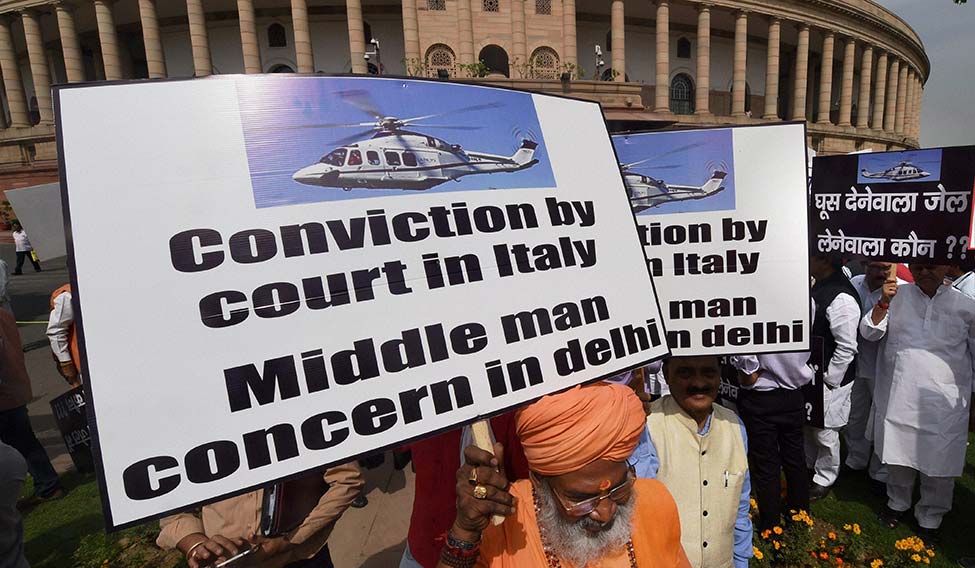 Turbulent session: BJP MP Sakshi Maharaj leading a protest against the AgustaWestland scam outside Parliament | PTI
Turbulent session: BJP MP Sakshi Maharaj leading a protest against the AgustaWestland scam outside Parliament | PTI
The apparent facts of the case aren’t very complicated unlike most weapon purchase deals. With its Mi-8 helicopters ageing, the IAF in 1999 wanted a new fleet to ferry not only VVIPs such as the president and prime minister but also the defence minister, the service chiefs and the commanders-in-chief over short distances. Since that was the post-Kargil time when the hyperactive defence minister George Fernandes was flying to Siachen every two months and was even inviting other VVIPs to visit the snowy heights, it was proposed that the air staff qualitative requirements (ASQR) for the helicopters should specify that those should be able to fly up to 6,000 metres.
As responses to the IAF’s global requests for proposal arrived, it was found that there was only one helicopter in the world, the Eurocopter EC225, that met the 6,000-metre ceiling. (“If we had gone ahead with it, that would also have been questioned,” remarked an air officer). Air Chief Marshal S. Krishnaswamy, who had a reputation of being a no-nonsense chief, apparently was not pleased with it. He is said to have advised that the matter be referred to the PMO since the helicopters were also meant for the travel needs of the prime minister.
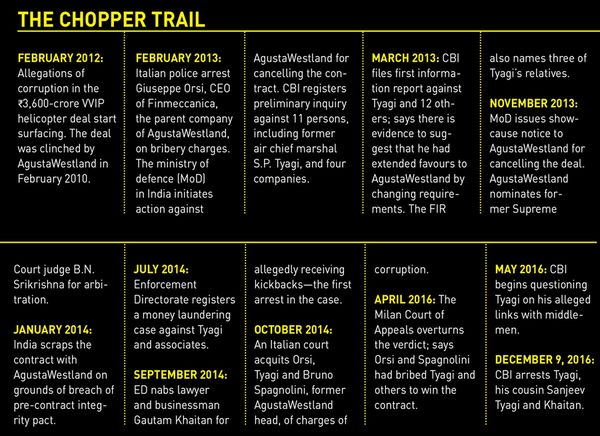
In the PM’s office, the file went to Vajpayee’s national security adviser Brajesh Mishra. Mishra reportedly had two objections: one, that near-impossible altitude ceiling of 6,000 metres had led to a single-vendor situation; two, if the helicopters were meant for the travel requirements of the prime minister, the Special Protection Group that looked after the prime minister’s security, be consulted. On its part, the SPG is said to have asked for more cabin height so as to enable the security men to stand up erect, which, too, would later suit AgustaWestland.
By now, the IAF’s succession plan was known. Krishnaswamy was to retire in December 2004 and Tyagi, who was the senior most among the commanders-in-chief would be the next chief. Tyagi also had an illustrious record in the force. He had been head of air intelligence, chief of operations, and one of the few officers in the Air Force who had commanded three of the four war-fighting commands. His credentials were such that there was no way he could have been overlooked for promotion as chief. It is alleged that it was during this time, when he was waiting in the wings literally, that he came to be compromised.
An incoming service chief, unless he is already at the air headquarters as vice-chief, is usually attached to the headquarters months before he takes over so that the transition is smooth. According to the CBI, it was during this attachment period at the headquarters that Tyagi is alleged to have intervened on behalf of the Anglo-Italian company and even tweaked the power requirement of the chopper to “at least” two engines which suited only AgustaWestland.
In 2004, the Vajpayee-led NDA was vanquished in the election and the UPA under Manmohan Singh came to power. Tyagi took over from Krishnaswamy on December 31, 2004.
In March 2005, the IAF finally lowered its altitude requirement to 4,500 metres, and this was approved by the new PMO. Now nearly half a dozen helicopter-makers qualified to compete. New requests for proposal were issued. Most had to be weeded out for not meeting the ASQR. Finally only two remained, the Anglo-Italian AgustaWestland of Finmeccanica and S-92 of Sikorsky, US. As trials were held in 2006-08 in the US and the UK, allegedly in violation of the requirement that the machines ought to be tried in Indian conditions, too, the IAF raised the requirement of the number of helicopters from eight to twelve, the new four to be in non-VVIP configuration.
In the trials, Sikorsky’s S-92 was found to be not meeting four of the requirements and the choice fell on AgustaWestland. Sikorsky cried foul, but that was taken to be just a loser’s grumble. By the time Tyagi retired from service on March 31, 2007, the deal had been more or less clinched.
In 2010, after three years of technical and price negotiations, the ministry signed a deal with AgustaWestland for buying 12 choppers for Rs 3,600 crore. The first three machines landed at Palam air base in 2012-13.
In February 2012, the Italian attorney-general’s office began a probe into certain unethical dealings by Finmeccanica, including the one with India. A few months later the Swiss police arrested one Guido Ralph Haschke, a middleman who allegedly got 51 million euros for swinging the contract. In February 2013, the Italian police arrested the Giuseppe Orsi, former chairman and chief executive of Finmeccanica, charging him with paying a bribe of Rs 360 crore to intermediaries to secure the sale of the helicopters to India.
The Italian prosecutors alleged that Orsi and others had paid money to Haschke and others who, in turn, paid Tyagi, through his cousins. To prove the charge, the Italian investigators had secretly recorded conversations among Haschke, his business partner Carlo Gerosa and two other individuals while they were travelling in Switzerland. Haschke spoke of money having been routed through Mauritius and Tunisia, so as to make it difficult for the Indian investigators (whom he referred to as “morons” who would take years to track down the links) to trace. The references to Tyagi, too, weren’t flattering. Going by the probe report, they called him ‘guily’ or pretty girl.
The Italian prosecutors also had a testimony by Lorenzo Borgogni, former head of external relations at Finmeccanica. Borgogni alleged that Haschke had been hired as an “intermediary”and that his fees had been hiked from 31 million euros to 41 million. The 10 million was to pay off a few Italian politicians.
Orsi was arrested in February 2013 and within a week, the overcautious Indian defence minister A.K. Antony ordered a probe by the CBI. In two weeks the CBI began probing the activities of 11 persons, including Tyagi and his three cousins.
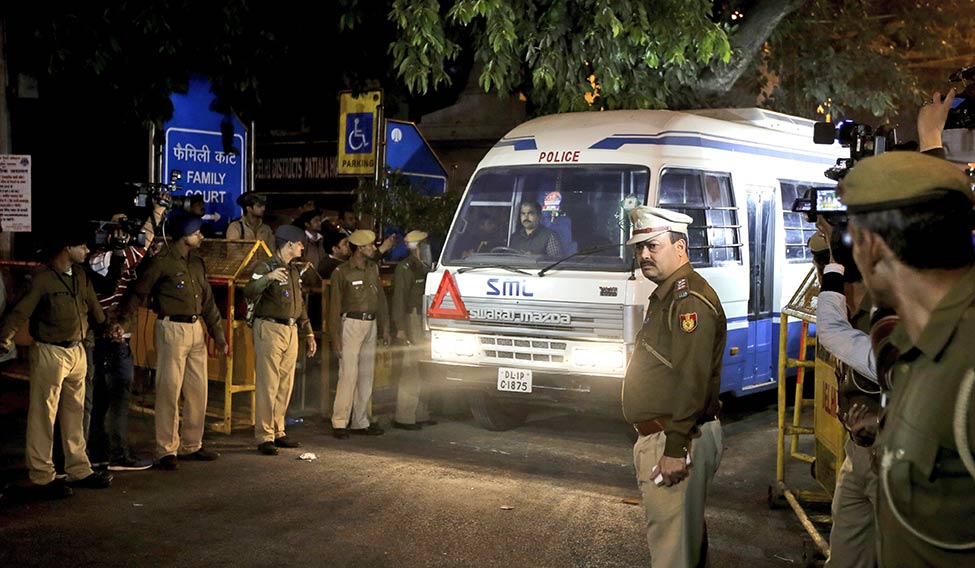 Wheels of misfortune: A CBI vehicle carrying S.P. Tyagi arriving at a Delhi court, which remanded him to custody | AP
Wheels of misfortune: A CBI vehicle carrying S.P. Tyagi arriving at a Delhi court, which remanded him to custody | AP
On the CBI’s interrogation, Tyagi admitted to have interacted with Orsi and his men, but denied having done anything to favour the company or accepted any gratification. But the mention in the Italian chargesheet that the Tyagi brothers had been paid 1,00,000 euros hung like a Damocles sword over him. A year later, Antony scrapped the deal and ordered that the bank guarantees furnished by the company be cashed.
In 2014, the UPA was voted out of power. The new Narendra Modi government ordered an Enforcement Directorate probe. In September 2014, the directorate arrested Khaitan, who ran a bogus tech company in Chandigarh, on the charge of laundering the kickback money. On August 7, 2016, an Italian court observed that Tyagi, too, could have received kickbacks.
Now, the specific charge against Tyagi in the Indian FIR is that the “changes in operational requirements (ORs) made the private company based in the UK eligible to participate in the request for proposal for VVIP helicopters. It was revealed during investigation that such undue favours were allegedly shown to said the UK-based private company by accepting the illegal gratifications from the accused vendors through middlemen/relatives including his (Tyagi’s) cousin and an advocate who accepted the illegal gratification for exercising influence through illegal means, or using personal influence over the concerned public servants.”
The CBI now claims that it delayed Tyagi’s arrest as it was waiting for incriminating evidence against him. It claims to have it, mainly in the responses to the letters rogatory (judicial requests) they had sent to Italy, Mauritius, Tunisia and Switzerland. The last response was received on November 28. From the evidence, says the CBI, it is clear that Tyagi had met Haschke and Gerosa when he was chief. The CBI alleges that the Tyagi brothers have been long-time associates of the Italian middlemen.
The probe now on in India is into Tyagi’s investments in property and banks, especially after 2004-05. There is also an attempt to find out where the money went after reaching Tyagi’s cousins. “Letters rogatory have been sent to several countries to gather more leads and evidence,” said an officer.
What next? With the filing of the first charge-sheet, the agency hopes to push for the extradition of another alleged middleman, a British national by name Christian Michel, who visited India several times between 1997 and 2013 from the UAE. Michel had written to the CBI in August expressing willingness to join the probe and requested the CBI to withdraw a pending red corner notice against him. Michel has been hinting that Tyagi was just a cog in the wheel.
Tyagi is also preparing for a bold fightback. When he was brought into the packed courtroom in the Patiala House court in Delhi before being remanded to CBI custody, his lawyer Hariharan dropped a bombshell. “It was a collective decision and not his (Tyagi’s) individual one,” said Hariharan, opposing the CBI’s remand application. “It was a collective decision of which the PMO was also a part.”
There are indications that Tyagi would drag in the PMO, but Hariharan would not confirm. “Everything is out in the open,” he told THE WEEK. “I told the court what I had to. But can the media trial stop now and allow both the CBI and the defence to do their jobs?’’
The reference to Manmohan Singh’s PMO isn’t new. The monsoon session of Parliament had witnessed stormy scenes when the ruling BJP sought to corner the Congress, particularly by bringing in the name of Sonia’s Gandhi’s political adviser Ahmed Patel. But a bold defence by the Congress, especially by Antony in the Rajya Sabha, had blunted the attack.
Today if the CBI guns for a Congress leader or PMO officials of the UPA era, it will have to explain why it is not questioning those who served in Vajpayee’s PMO. The CBI has already recorded the statements of Manmohan Singh’s national security adviser M.K. Narayanan, SPG chief B.V. Wanchoo and Intelligence Bureau chief E.S.L. Narasimhan who is said to have been at the meeting held in 2005 in which the change in specifications was finalised. THE WEEK approached Wanchoo, but he refused to comment. “Whatever I had to say I have told the CBI. I do not wish to say anything more,” he said.
Narayanan is said to have told the CBI that Manmohan Singh’s PMO had not invented the wheel; it had rather followed the process kickstarted by Vajpayee’s PMO in 2003. It was after this noting from Mishra that in March 2005, the IAF changed its altitude requirement for chopper acquisition. A year later, in 2006, it raised the requirement of the number of helicopters for the VVIP entourage from eight to twelve. The deal was finally clinched with AgustaWestland meeting the requirements in 2010.
Clearly, the CBI, under its interim chief Rakesh Asthana, will be walking a tightrope. It also is suffering from an image problem. Its credibility had been under strain, especially after the Supreme Court had called it a “caged parrot” a few years ago. Now, with the Modi government dragging its feet on appointing a full-time chief for the agency, Tyagi’s lawyer Menaka Guruswamy, too, harped on the charge of media trial. The court has all the details, but the “CBI is repeating all these details for the media,’’ she alleged in the court during the bail hearing on December 14.
But the court wasn’t moved. The 71-year-old “decorated war hero”, who had undergone a bypass surgery, wasn’t a picture of military dignity when the court sent him to three more days of CBI custody.
WITH R. PRASANNAN




